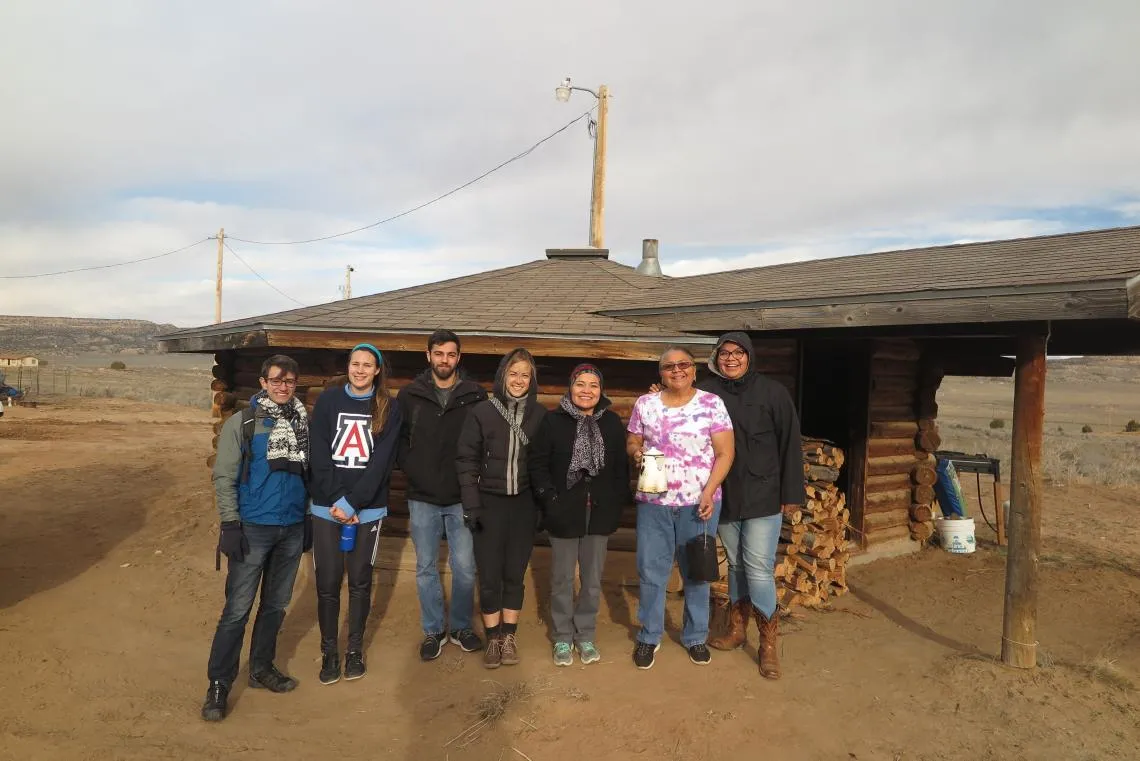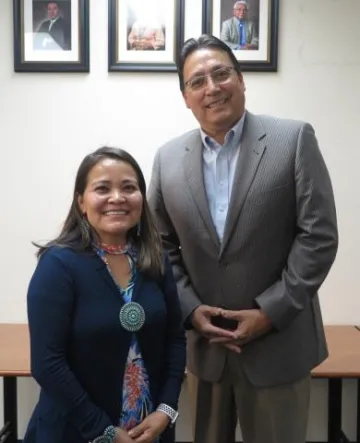Indige-FEWSS Spring Break Immersion in Navajo Country

“It was an incredible honor to be allowed to learn some of the oral histories of the Navajo people,” said Indige-FEWSS fellow, Kyle Boyer.

Indige-FEWSS PI, Dr. Karletta Chief with Diné College President, Charles Roessel
Image Credit: Torran Anderson
The NSF-funded Indigenous Food, Energy, and Water Security and Sovereignty (Indige-FEWSS) project, supported by IES, undertook a cultural immersion trip to Navajo Nation from March 4th-8th. The trip was an opportunity to learn from government agencies, tribal colleges and community members about the food, energy and water issues facing Navajo Nation. Trip participants included: Indige-FEWSS PI and UA Professor of Soil, Water, and Environmental Science, Dr. Karletta Chief; UA Professor, Dr. Bob Arnold; IES staff, Torran Anderson and Indige-FEWSS fellows: Michael Anderson, Kyle Boyer, Manuelito Chief, Mark Clytus, Caitlyn Leo, Nikki Tulley, Bekah Waller and Chris Yazzie.
Highlights of the action packed trip included:
- Presentations from the Navajo Nation EPA and Navajo Tribal Utility Authority.
- Hearing the story behind the mural in the Navajo Nation Council Chambers and climbing to the peak of the Window Rock arch.
- Meeting Navajo Technical University (NTU) faculty and students and touring their high tech “Fab Lab” in Crownpoint, NM.
- Discussing food, energy and water infrastructure questions with Diné College President, Charles Roessel, and faculty in Tsaile, AZ.
- Hiking to the bottom of Canyon de Chelly.
- Experiencing traditional food and storytelling with Mrs. Leila Help-Tulley and her family in Blue Gap, AZ and spending the night in their family Hogan.
- Visiting locations in Blue Gap with Mr. Earl Tulley such as an abandoned uranium mine site and learning how it has effected the community.
- Planting seeds with community elders at the Blue Gap chapter house.
- Traveling to Tuba City to tour the Rare Metals Department of Energy Uranium Mill Tailings Remedial Action Site.
- Experiencing water hauling for a Tuba City community member who doesn’t have running water.
While many of the trip participants had heard statistics about Navajo Nation, such as approximately 35% of dwellings are not connected to central power or potable water, this trip was an opportunity to hear first-hand from utilities and tribal colleges working to address these challenges and to discuss with community members their perspective on the changing water, food and energy issues. Indige-FEWSS fellows, Nikki Tulley and Chris Yazzie, generously took us into their families’ homes who shared their stories and insights with us and made the local experience of this trip possible. The learning experiences gathered from the trip sets the stage for our ongoing collaboration with Diné College and Navajo Technical University. Indige-FEWSS fellow, Michael Anderson, commented on these partnerships, “It was very encouraging to see the interest, excitement and ideas that NTU and Dine College faculty had for collaborative projects.”
The Indige-FEWSS project will return to Navajo Nation from June 3rd-7th to participate in a Tribal Colleges and Universities Program (TCUP) training at Diné College and a public presentation of a mobile water purifying unit.




